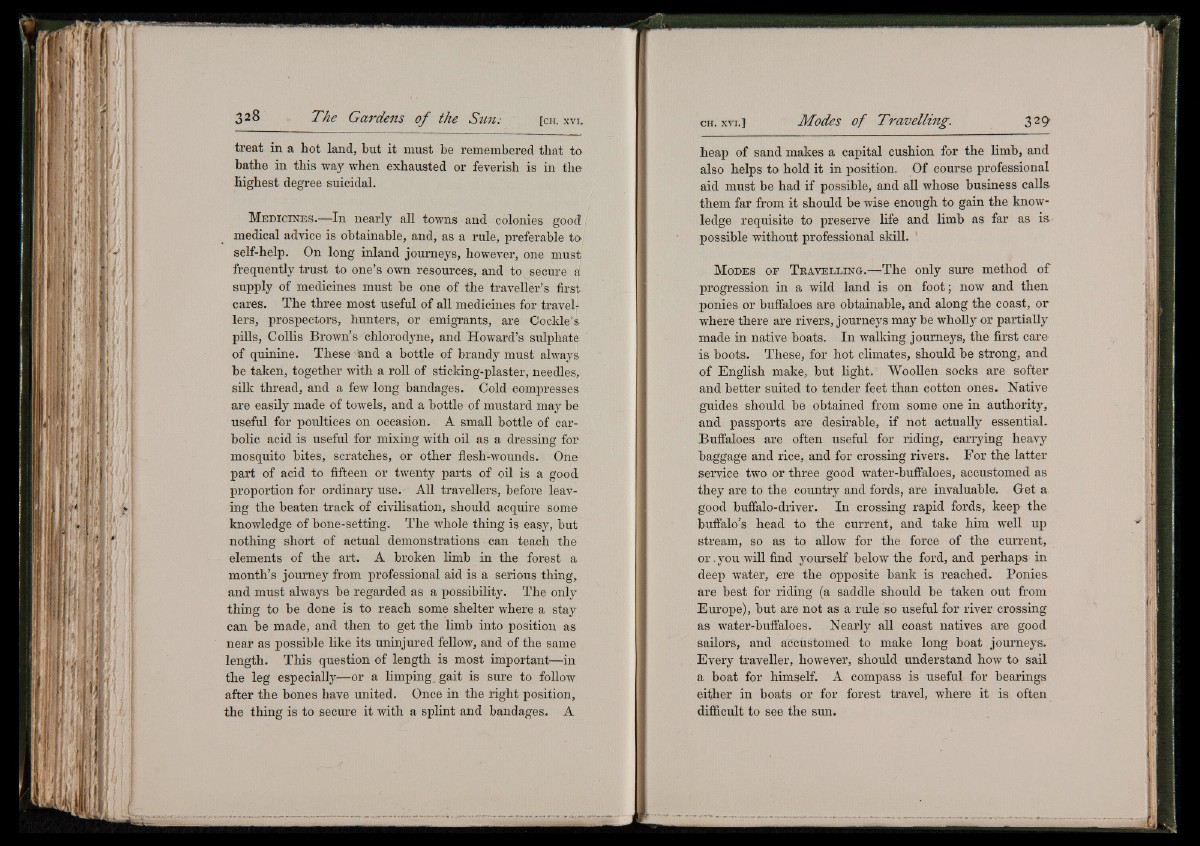
treat in a hot land, but it must be remembered that to
bathe in this way when exhausted or feverish is in the
highest degree suicidal.
M e d ic in e s .—In nearly all towns and colonies good
medical advice is obtainable, and, as a rule, preferable to>
self-help. On long inland journeys, however, one must
frequently trust to one’s own resources, and to secure a
supply of medicines must he one of the traveller’s first
cares. The three most useful of all medicines for travelf
lers, prospectors, hunters, or emigrants, are Cockle’^
pills, Collis Brown’s chlorodyne, and Howard’s sulphate
of quinine. These ‘and a bottle of brandy must always
be taken, together with a roll of sticking-plaster, needles,
silk thread, and a few long bandages. Cold compresses
are easily made of towels, and a bottle of mustard may be
useful for poultices on occasion. A small bottle of carbolic
acid is useful for mixing with oil as a dressing for
mosquito bites, scratches, or other flesh-wounds. One
part of acid to fifteen or twenty parts of oil is a good
proportion for ordinary use.- All travellers, before leaving
the beaten track of civilisation, should acquire some
knowledge of bone-setting. The whole thing is easy, but
nothing short of actual demonstrations can teach the
elements of the art. A broken limb in the forest a
month’s journey from professional aid is a serious thing,
and must always be regarded as a possibility. The only
thing to be done is to reach some shelter where a stay
can be made, and then to get the limb into position as
near as possible like its uninjured fellow, and of the same
length. This question of length is most important—in
the leg especially—or a limping, gait is sure to follow
after the bones have united. Once in the right position,
the thing is to secure it with a splint and bandages. A
heap of sand makes a capital cushion for the limb, and
also helps to hold it in position. Of course professional
aid must be had if possible, and all whose business calls
them far from it should be wise enough to gain the knowledge
requisite to preserve life and limb as far as is.
possible without professional skill.
M odes oe T r a v el l ing .—The only sure method o f
progression in a wild land is on foot; now and then
ponies or buffaloes are obtainable, and along the coast, or
where there are rivers, journeys may be wholly or partially
made in native boats. In walking journeys, the first care
is boots. These, for hot climates, should be strong, and
of English make, but light. Woollen socks are softer
and better suited to tender feet than cotton ones. Native
guides should be obtained from some one in authority,
and passports are desirable, if not actually essential.
Buffaloes are often useful for riding, carrying heavy
baggage and rice, and for crossing rivers. For the latter
service two or three good water-buffaloes, accustomed as
they are to the country and fords, are invaluable. Get a
good buffalo-driver. In crossing rapid fords, keep the
buffalo’s head to the current, and take him well up
stream, so as to allow for the force of the current,
or.you will find yourself below the ford, and perhaps in
deep water, ere the opposite bank is reached. Ponies
are best for riding (a saddle should be taken out from
Europe), but are not as a rule so useful for river crossing
as water-buffaloes. Nearly all coast natives are good
sailors, and accustomed to make long boat journeys.
Every traveller, however, should understand how to sail
a boat for himself. A compass is useful for bearings
either in boats or for forest travel, where it is often
difficult to see the sun.